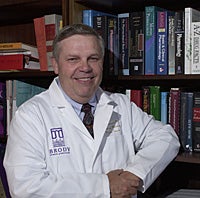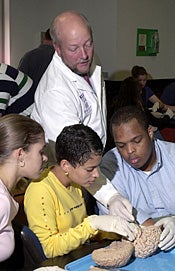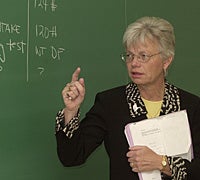Board of Governors honors three Brody professors

Sometimes students need firm motivation, and sometimes they need a hug, according to Dr. Don Barnes, a pharmacologist. Photo by Cliff Hollis.
GREENVILLE, N.C. (June 5, 2002) — Three local recipients of the University of North Carolina Board of Governors Distinguished Professor of Teaching Award share a common trait – a love of sharing their knowledge.
Six recipients were honored from East Carolina University with the award, with three from the Brody School of Medicine – the most ever. Dr. Peter Kragel, interim medical school dean, said that reflects well on the caliber of the faculty as a whole.
Dr. Don Barnes, professor of pharmacology, Dr. Dick Ray, professor of physiology, and Dr. Kathy Kolasa, professor of family medicine, have been recognized by the Board of Governors this year and were also in the first group of master educators recognized by the medical school in December.
Nominating master educators for the UNC teaching award just made sense, said Kragel, who is also chairman of the Department of Pathology and Laboratory Medicine. “It’s part of recognizing our people who do such a great job teaching, with an emphasis to recognize them here at the school and outside. They didn’t just come here; they have always been doing these things,” he said.
In Kragel’s eyes, “a good teacher is someone who does what it takes for his students to master the material and to get them involved in the educational process. Whatever it takes, even if that means standing on their heads,” he said.
Paternalistic and thorough
In 1971, Barnes arrived at the ECU medical school before there was a building, much of a curriculum or even students. He is one of the school’s 15 original faculty members who helped build the Brody School of Medicine into what it is today.

Dr. Richard Ray, professor of physiology, was once noted as an “esteemed graduate of the School of Monotone Lecturing.” That’s changed. Photo by Cliff Hollis.
“I came to ECU directly from graduate school on the premise of a newly established two-year medical school, but soon discovered that the school wasn’t funded. For the first three years, we began with a one-year program of 20 students who were admitted from the waiting list at UNC-Chapel Hill.
“I came here because there was an opportunity to teach,” he said. “There were big teaching responsibilities from the day I walked in the door.”
Barnes had taught some while earning his doctorate in pharmacology at the Medical College of Virginia. “Not to say I was an expert in teaching when I got here, and I’m still learning,” he said.
Students and their needs have changed through the years. Effective teachers have to adapt to these changes. Barnes will quickly admit that not “every one of my teaching activities (has) been successful” and that’s OK with him “as long as the students leave with a solid understanding of advantages and disadvantages of drugs as therapeutic tools.”

Dr. Kathy Kolasa, nutritionist and professor of family medicine, sees “a little bit of mission work” in her teaching. Photo by Cliff Hollis.
He describes himself as tough but fair in the classroom. “I have high expectations of students and they usually respond favorably,” he said. Barnes is proud that students in the courses he directs traditionally do well on board exams at the end of their second year. “One of the primary objectives is that the students succeed, but that doesn’t mean to make the material easy,” Barnes said. “Every drug they learn about, they will use on a patient. There must be a reasonable amount of rigor without being too demanding of the students.” Barnes said he’s willing to try just about anything to help students understand the material. “Teachers can and should play a significant role in the lives of students by serving as advisors and mentors. A certain degree of prudent paternalism is extremely appropriate for a successful teaching environment,” Barnes wrote in his teaching philosophy statement. “Being a good teacher means more than just presenting your material,” he said. “When students are having difficulty, you have to determine whether they need a firm motivational discussion, a hug or a new direction in approaching their studies.”